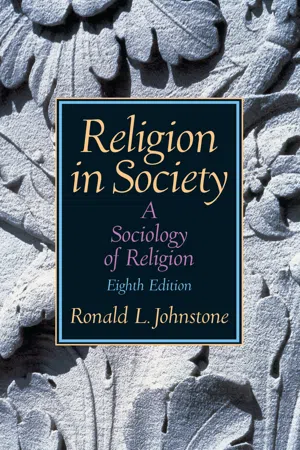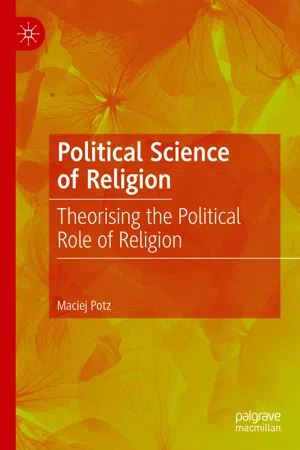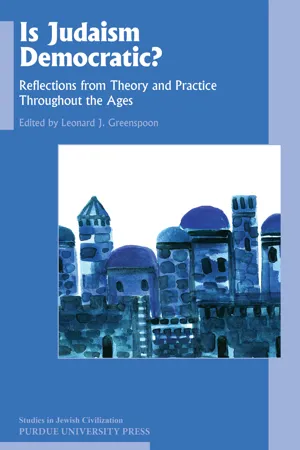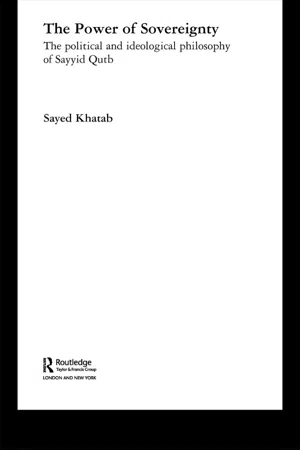Politics & International Relations
Theocracy
Theocracy is a form of government in which religious leaders hold political power and the state is governed by religious principles. In a theocratic system, religious laws and doctrines often influence the legal and political framework, and the government is typically closely intertwined with the dominant religion. This can lead to a blending of religious and political authority within the ruling structure.
Written by Perlego with AI-assistance
Related key terms
4 Key excerpts on "Theocracy"
- eBook - ePub
Religion in Society
A Sociology of Religion
- Ronald Johnstone(Author)
- 2015(Publication Date)
- Routledge(Publisher)
What are some of these areas of impact of religion on political life? We would mention such outcomes as approval of the Prohibition Amendment in 1919, patriotic support for World War I and World War II, the anticommunism crusade of the 1950s, the civil rights movement in the 1960s. While each is a complex case study in itself, about which many volumes have been written with many more yet to come, they are listed here to stimulate discussion and inquiry by the readers. Some were pursued by the right, some by the left, and certainly some by numerous religious organizations and people speaking with a fairly united voice. We mention them simply to note that religious groups, movements, and coalitions have influenced the political process and outcome in the broader society.The Relationship of Religion and Politics
What, then, is the relationship of religion to politics? We should expect, considering the broad scope of our definition of politics, which implies a great diversity of processes, norms, and behavior, that there will be a variety of ways in which religion relates to the institution of politics.This certainly has been the case. But we shall not go into all of the many types of relationships. We shall simply outline the range of possibilities and then discuss the most common pattern.At one end of the continuum is the pure Theocracy. Theocracy literally means, “rule by God.” Thus religious leaders are seen as ruling all of society in God’s name and ostensibly according to His wishes. Actually, the state as a distinct entity does not exist in a Theocracy. The rule of Israel by God’s prophets in the Old Testament period is an example of the pure Theocracy. A prophet, such as Samuel, was seen as God’s spokesman regarding, not only religious matters, but political and governmental matters as well. Interestingly enough, the people chafed under this arrangement—they pleaded embarrassment in the face of surrounding societies who were under the rule of kings and appealed for a similar “separation” of church and state.Closely related is the modified Theocracy. In this case, while the state is subordinate to the religious institution and its leaders, even in temporal affairs, the state nevertheless exists as a separate entity. The state is seen here as the enforcement agency of religion, an agency necessary because of the tendency of people to deviate from societal norms but to depend on religion for its authority. Most medieval European societies dominated by Roman Catholicism were of this type. Similarly, John Calvin’s Geneva and the early Massachusetts Bay Colony are good examples. Further, the relationship of Buddhism to the government of Sri Lanka (Ceylon) from the third century b.c.e. until the nineteenth century c.e. - eBook - ePub
Political Science of Religion
Theorising the Political Role of Religion
- Maciej Potz(Author)
- 2019(Publication Date)
- Palgrave Macmillan(Publisher)
Yet, the democratic procedure in no way implied the contractual character of these political systems: it would occur to nobody that the governor’s power comes from the people in the sense of being the expression of popular sovereignty. No—his power came from God, who merely used the electorate as the instruments for revealing his choice. In this way, the concept of Theocracy, a somewhat antiquarian term used mainly for the ancient empires of the Near East, can be reintegrated into the framework of comparative politics with considerable explanatory potential. 3 3.3 Origins and Stability of Theocratic Regimes The origin of particular theocracies is, of course, an empirical question of historical enquiry which cannot be definitely resolved with a single model, just as the theories of state formation (hydraulic, conquest, patriarchal etc.) do not explain the history of each and every state. The purpose of this exercise is, rather, to conceptualize, in the language of the economic approach set out above (Sect. 2.4), typical power relations which tend to emerge between the rulers, the religious functionaries and the society in theocracies. The following transactional model of the origins and conditions of stability of theocratic political systems is derived from sociological theories of social exchange. The social exchange theories, as developed by, among others, Blau and Emerson, conceive of all social relations as a series of transactions in the course of which various goods, material and non-material, economic and symbolic, ranging from physical objects, money and labour, to information, ideas, beliefs, to social status, prestige and power, are exchanged between individual and collective social actors. Power is conceptualized as arising from unequal exchange relation, where one party to this relation, B, is unable to return goods of equal value to goods provided by the other party, A - eBook - ePub
Studies in Jewish Civilization
Reflections from Theory and Practice Throughout the Ages
- Leonard J. Greenspoon(Author)
- 2018(Publication Date)
- Purdue University Press(Publisher)
2 However, when it was felt that these rationales were adhered to with insufficient honesty, or that Theocracy was being abused as a post facto rationalization for naked human power, monarchies have faced challenges from both aristocratic and democratic quarters. In particular, when grievances are rooted in a sense of insufficient adherence to divine will, the aristocracy of religious specialists—whether priests, prophets, or sages—has claimed the right, minimally, to challenge monarchy in the name of God’s rule and, maximally, to establish their own rule in the place of the monarch.Despite this common-sense understanding of Theocracy, however, I want to focus here on the original sense of the term, in which it is considered a free-standing, independent alternative to all the types of human politeia. In this strong sense, God is not seen as merely the source of authority—an interpretation that, again, could render Theocracy compatible with almost any human arrangement, whether monarchic, aristocratic, or democratic—but literally as ruler. God rules now, and not in some distant future; in this reality, and not in some ideal world. God rules us, human beings, and not just the angels or the other heavenly beings; he rules the earth, and not the “cosmos” in some grand, metaphorical sense. This is God as our actual, present political leader, not as “king of the gods,” or object of cultic worship, or origin of everything that happens, or metaphysical substrate of Being.This sense of Theocracy might be hard to understand at first. How can God rule, after all, except through the intermediary of some human or group of humans? Doesn’t someone have to tell us what God’s will is, and doesn’t whoever does so automatically become the de facto holder of sovereign power? Aren’t we then inevitably led back to either the divine right of kings or the rule of some clerical class? The answer, for defenders of the strong sense of Theocracy, has to be no. Monarchy is always and simply mere human rule, and the rule of the clergy would be better called “ecclesiocracy” or “hierocracy.” The idea of true Theocracy is direct, and not mediated by any human authority permanently enshrined for the purpose. But how can this be any more than an insistence, an assertion of an ideal against all common sense and the evidence of reality? - eBook - ePub
The Power of Sovereignty
The Political and Ideological Philosophy of Sayyid Qutb
- Sayed Khatab(Author)
- 2006(Publication Date)
- Routledge(Publisher)
196The legal implication of this is that the government in Islam is limited to a constitution that is divinely inspired and that all Muslims are agreed upon it. Islamic government, then, is not absolute government, nor it is an autocratic or authoritarian.According to al-Zalabani, ‘the limitation of governmental power in regulating the affairs of the people is the central principle of constitutional rule.’197 This means that the government in Islam is constitutional since it is limited to the shari‘ah, the constitution of the Muslims.Consequently the limitation of Islamic government to shari‘ah does not imply that Islamic government is theocratic. Theocracy has been defined as a ‘State which has either an overt or covert religious basis’198 and is ‘run by a priestly class. Here a particular class of chosen mortals alone claims to understand the Will and Utterances of God, and it has therefore the final say in all matters of life’.199 Whatever may be the different forms of Theocracy, there is one thing common in them. For example, Theocracy is a type of government wherein ‘the person or persons at the helm of affairs are regarded as superhuman beings who are raised above the common people by the Almighty God Himself. The elevation of the Government is thus divine and, therefore, absolute . . .’200 Thus, in Theocracy those who govern the affairs of the people are considered to be infallible sincethey are the manifestations of God Himself on the earth and are directly dictated by Him. The people have, therefore, no right to advise or instruct them and if they do so, they are insulting the Almighty God Himself. Advice is a sin in Theocracy. This is not the case in the Islamic State.201By contrast, according to Qutb, there is no priesthood in Islam. The Chief Executive is not a divine or divinely chosen, but chosen by the absolutely free choice of the community.202 Unlike the head of Theocracy, the head of the Islamic State is required to take counsel from the consultation council (Majlis al-Shura) in all important matters of the State.203
Index pages curate the most relevant extracts from our library of academic textbooks. They’ve been created using an in-house natural language model (NLM), each adding context and meaning to key research topics.



